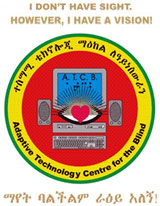Together for accessibility: ICT for the blind and visually impaired
19-12-2007 (Addis Ababa)

ATCB logo
© ATCB
A workshop was organized on 13 December 2007 at the Pioneer Collegiate for the Blind, Addis Ababa (Ethiopia) by UNESCO and the Adaptive Technology Center for the Blind (ATCB) to bring together members of the visually impaired community and other interested stakeholders.
The workshop focused on ensuring greater harmonization of efforts and developing an action plan to support access to ICT assistive tools by visually impaired students at the Addis Ababa University (AAU).
About 60 persons from government, universities, NGOs and international organizations working on disability issues participated. The workshop focused on four key areas:
A number of practical measures are however needed, such as ensuring access to training, development of relevant content, provision of software and hardware resources and greater awareness about existing opportunities. While a number of policies regarding the rights of persons with disabilities exist in Ethiopia, efforts to monitor their implementation are necessary.
The Workshop participants identified the following priority areas for follow-up action, and a working group was created to develop a strategy for addressing these challenges in the first quarter of 2008:
UNESCO and ATCB have been working together for several years to foster access to ICT amongst the visually impaired community. Some of the initiatives undertaken include ICT projects targeting rural schools for the blind and the training of teachers and other civil servants with visual disabilities.
About 60 persons from government, universities, NGOs and international organizations working on disability issues participated. The workshop focused on four key areas:
- showcasing the achievements made in a recent ICT Trainer of Trainees programme that involved blind students from AAU and Kotebe College of Teacher Education (KCTE);
- discussing strategies that could enhance access of blind persons to information, computer skills so as to increase their independence, success in academic life and in obtaining employment;
- identifying resources required to support access to electronic and print information of blind persons;
- addressing sustainability and expansion of existing ICT for the blind structures.
A number of practical measures are however needed, such as ensuring access to training, development of relevant content, provision of software and hardware resources and greater awareness about existing opportunities. While a number of policies regarding the rights of persons with disabilities exist in Ethiopia, efforts to monitor their implementation are necessary.
The Workshop participants identified the following priority areas for follow-up action, and a working group was created to develop a strategy for addressing these challenges in the first quarter of 2008:
- using a media advocacy campaign to promote a more disability-friendly academic and work environment;
- facilitating access to electronic and braille learning materials, particularly lecture notes, course and reference textbooks on the AAU campus;
- providing technical training to support the AAU staff to better use existing resources for the visually impaired;
- sharing information, adapting and implementing experiences from other countries;
- providing inputs to the national Technical and Vocational Educational Training (TVET) being developed that incorporates the needs of persons with disabilities.
UNESCO and ATCB have been working together for several years to foster access to ICT amongst the visually impaired community. Some of the initiatives undertaken include ICT projects targeting rural schools for the blind and the training of teachers and other civil servants with visual disabilities.
 Blind students demonstrating computer skills
Blind students demonstrating computer skills© UNESCO/Paul Hector
Related themes/countries
· People with disabilities and ICT: News Archives 2007
· Ethiopia: News Archives 2007
Share this story:
Contact information
- UNESCO
Source














